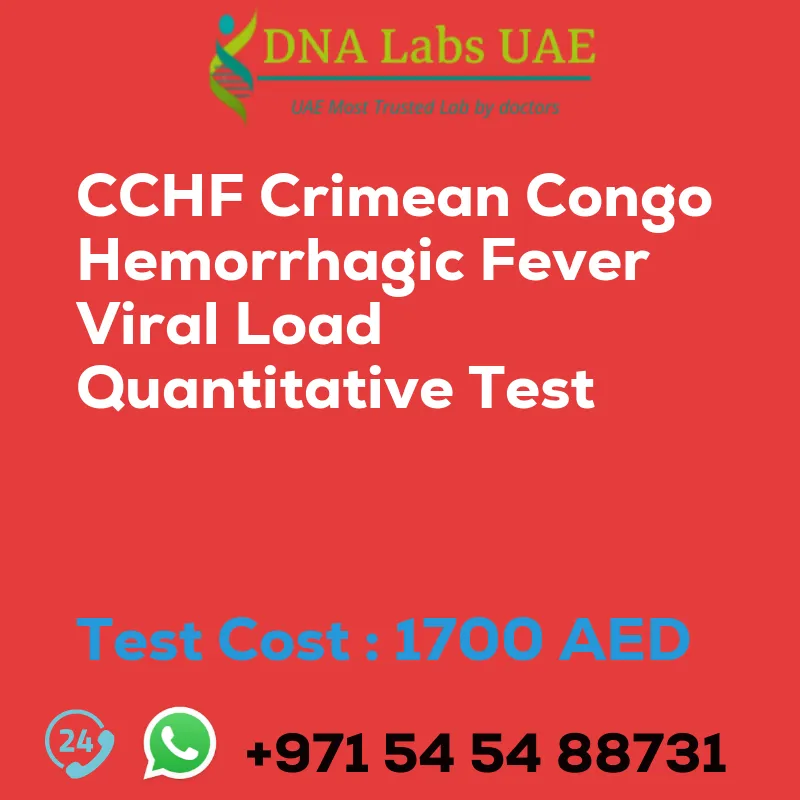CCHF Crimean Congo Hemorrhagic Fever Viral Load Quantitative Test
Components: Whole Blood, serum, plasma, C.S.F., etc.
Price: 1700.0 AED
Sample Condition: Whole Blood, serum, plasma, C.S.F., etc.
Report Delivery: 4th Working Day (Email: 48 hours, On phone: 36 hours)
Method: Real Time PCR
Test Type: Viral
Doctor: Physician
Test Department: Genetics
Pre Test Information: Need to sign Consent document and bring any clinical history of patient for CCHF (Crimean Congo Hemorrhagic Fever) Viral Load Quantitative Test
Test Details
The CCHF (Crimean Congo Hemorrhagic Fever) viral load quantitative test is a diagnostic test used to measure the amount of the Crimean Congo Hemorrhagic Fever virus in a patient’s blood. This test is typically performed using a technique called polymerase chain reaction (PCR), which amplifies the viral genetic material present in the blood sample.
The test is primarily used to monitor the progression of the infection and assess the effectiveness of treatment. It can also be used to determine the viral load before and after a patient undergoes certain medical procedures, such as blood transfusions or organ transplants, to ensure the absence of the virus. A high viral load may indicate a more severe infection and a higher risk of complications. Conversely, a decreasing viral load over time may suggest that the treatment is effective in controlling the infection.
It is important to note that the CCHF viral load quantitative test is typically performed in specialized laboratories equipped to handle high-risk pathogens. The test results should be interpreted by a healthcare professional who is experienced in managing infectious diseases.
| Test Name | CCHF Crimean Congo Hemorrhagic Fever Viral Load Quantitative Test |
|---|---|
| Components | |
| Price | 1700.0 AED |
| Sample Condition | Whole Blood, serum, plasma, C.S.F.etc. |
| Report Delivery | 4th Working Day Email : 48 hours.On phone : 36 hours |
| Method | Real Time PCR |
| Test type | Viral |
| Doctor | Physician |
| Test Department: | Genetics |
| Pre Test Information | Need to sign Consent document and bring any clinical history of patient forCCHF (Crimean Congo Hemorrhagic Fever) Viral Load QuantitativeTest |
| Test Details |
The CCHF (Crimean Congo Hemorrhagic Fever) viral load quantitative test is a diagnostic test used to measure the amount of the Crimean Congo Hemorrhagic Fever virus in a patient’s blood. This test is typically performed using a technique called polymerase chain reaction (PCR), which amplifies the viral genetic material present in the blood sample. The test is primarily used to monitor the progression of the infection and assess the effectiveness of treatment. It can also be used to determine the viral load before and after a patient undergoes certain medical procedures, such as blood transfusions or organ transplants, to ensure the absence of the virus. A high viral load may indicate a more severe infection and a higher risk of complications. Conversely, a decreasing viral load over time may suggest that the treatment is effective in controlling the infection. It is important to note that the CCHF viral load quantitative test is typically performed in specialized laboratories equipped to handle high-risk pathogens. The test results should be interpreted by a healthcare professional who is experienced in managing infectious diseases. |








